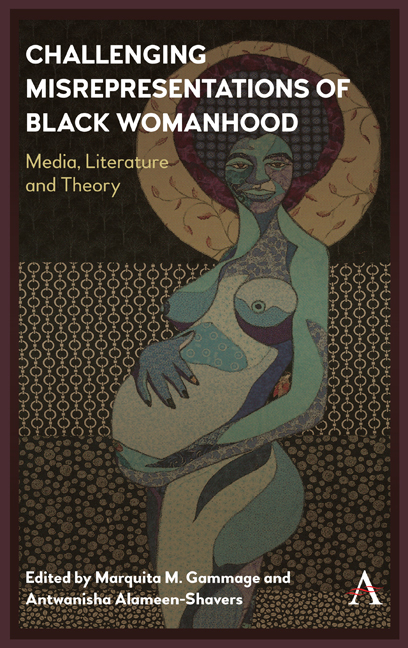Book contents
- Frontmatter
- Contents
- List of Figures
- Acknowledgments
- Introduction
- Chapter 1 Black Student Mothers: A Culturally Relevant Exploratory Study
- Chapter 2 Uninhabitable Moments: The Symbol of Serena Williams, Rage and Rackets in Claudia Rankine's Citizen: An American Lyric
- Chapter 3 “Black Women Are Genius!”: The Image of Celebrated Black Motherhood in Stand-Up Comedy?
- Chapter 4 The Virility of the Haitian Womb: The Biggest Threat to the Dominican Right
- Chapter 5 Ladyhood in Distress: Neoliberalism and Black Politics in Nicole Sconiers's Escape from Beckyville: Tales of Race, Hair, and Rage
- Chapter 6 Sapphires Gone Wild: The Politics of Black Women's Respectability in the Age of the Ratchet
- Chapter 7 Representing the Black Woman as Immoral and Abandoning the Black Family: A Cultural Analysis of Twenty-First-Century Television Dramas Starring Black Women
- Chapter 8 Historical Miseducation on Black Womanhood
- Chapter 9 Michelle Obama Laughs: Political Meme Warfare and the Regurgitation of the Mythological Black Woman
- Chapter 10 Kawaida Womanism as an Interpretative Framework for Understanding Africana Womanhood: Analyzing African American Women's Self-Perceptions
- List of Contributors
- Index
Chapter 4 - The Virility of the Haitian Womb: The Biggest Threat to the Dominican Right
Published online by Cambridge University Press: 29 May 2019
- Frontmatter
- Contents
- List of Figures
- Acknowledgments
- Introduction
- Chapter 1 Black Student Mothers: A Culturally Relevant Exploratory Study
- Chapter 2 Uninhabitable Moments: The Symbol of Serena Williams, Rage and Rackets in Claudia Rankine's Citizen: An American Lyric
- Chapter 3 “Black Women Are Genius!”: The Image of Celebrated Black Motherhood in Stand-Up Comedy?
- Chapter 4 The Virility of the Haitian Womb: The Biggest Threat to the Dominican Right
- Chapter 5 Ladyhood in Distress: Neoliberalism and Black Politics in Nicole Sconiers's Escape from Beckyville: Tales of Race, Hair, and Rage
- Chapter 6 Sapphires Gone Wild: The Politics of Black Women's Respectability in the Age of the Ratchet
- Chapter 7 Representing the Black Woman as Immoral and Abandoning the Black Family: A Cultural Analysis of Twenty-First-Century Television Dramas Starring Black Women
- Chapter 8 Historical Miseducation on Black Womanhood
- Chapter 9 Michelle Obama Laughs: Political Meme Warfare and the Regurgitation of the Mythological Black Woman
- Chapter 10 Kawaida Womanism as an Interpretative Framework for Understanding Africana Womanhood: Analyzing African American Women's Self-Perceptions
- List of Contributors
- Index
Summary
The Dominican Republic's conservative elite maintains a long history dating back to the nineteenth century of creating and promoting a national identity based on anti-Haitianism. A succinct definition of Dominican anti-Haitianism consists of “a legacy of racist Spanish colonial mentality, nineteenth-century racial theories, and twentieth-century cultural neo-racism into a web of anti-Haitian attitudes, racial stereotypes, and historical distortions” (Sagás 2000, ix). Underpinning this ultranationalism is the fear that Haitian immigrants politically and culturally threaten the Dominican Republic. Dominican anti-Haitianism suggests that Haiti represents all things backward, primitive and African, while the Dominican Republic strives to embody civilization, progress and Europe. The clashing representations posit both countries as dichotomous and perpetually in opposition (Valerio-Holguin 2000, 75). Because of the ways in which the Dominican elite imagines Haiti and Haitians, the latter are thus unwanted persons in Dominican territory. The Haitian migratory presence in Dominican territory threatens to blur the island's border.
Since the founding of the Dominican Republic in 1844, the conservative Dominican elite has fabricated and disseminated a plethora of stereotypes that vilify Haiti and Haitians. As a result, most Dominicans passively consume the anti-Haitian discourse from above (Torres-Saillant 1999, 23). Through the analysis of social media, nonfiction literature, news articles, legal debates and surveys, this chapter shows the ways in which conservative Dominican nationalists at the elite and the popular levels stereotype Haitians and Haitian women in particular. Haitian women are most vilified because they reproduce the Haitian nation and even more so when in the Dominican Republic. Ultranationalists blame Haitian women for further increasing the numbers of Black Dominicans of Haitian ancestry in the Dominican Republic, furthering the Black population. Milagros Ricourt (2016, 44) reinforces my thesis, stating that “the ‘maternal labor’ of Haitian women— that is, as mothers producing more Haitians— is the major danger in the reproduction of more Haitians in the Dominican Republic” (2016, 44). In the end, this chapter stands as a case study displaying how people of the African diaspora, specifically on the island of Hispaniola, use white supremacist ideas to vilify each other via women as a means to reinforce their distinct national identities and geographical and cultural boundaries.
- Type
- Chapter
- Information
- Challenging Misrepresentations of Black WomanhoodMedia, Literature and Theory, pp. 75 - 94Publisher: Anthem PressPrint publication year: 2019



